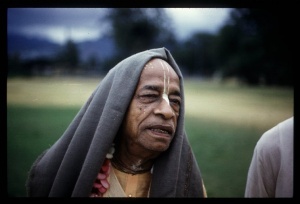SB 1.4.31 (1962): Difference between revisions
(Created page with '<div style="float:left">'''Goto SB 1.4.31 Current Edition'''</div> <div style="float:right">[[File:Go-previous.png|link=SB 1962 Fourth Chapter - Appearance of Sri N…') |
(Vanibot #0020: VersionCompareLinker - added a link to the Version Compare feature) |
||
| Line 1: | Line 1: | ||
<div style="float:left">'''[[SB | [[Category:Srimad-Bhagavatam (1962-1965) - Canto 01 Chapter 04]] | ||
<div style="float:right">[[File:Go-previous.png|link=SB 1962 | <div style="float:left">[[File:Go-previous.png|link=SB (1962) Fourth Chapter - Appearance of Sri Narada]] '''[[SB (1962) Fourth Chapter - Appearance of Sri Narada]]'''</div> | ||
<div style="float:right">[[File:Go-previous.png|link=SB 1.4.30 (1962)]] '''[[SB 1.4.30 (1962)]] - [[SB 1.4.32 (1962)]]''' [[File:Go-next.png|link=SB 1.4.32 (1962)]]</div> | |||
{{CompareVersions|SB|1.4.31|SB 1962|SB 1972-77}} | |||
{{RandomImage}} | {{RandomImage}} | ||
| Line 6: | Line 8: | ||
==== TEXT No. 31 ==== | ==== TEXT No. 31 ==== | ||
<div class="SB65verse"> | |||
Tasya ebam khilam atmanam manwamanasya khidyatah | |||
Krishnasya Naradobhyagad ashramam prag uddhritam | |||
</div> | |||
==== ENGLISH SYNONYMS ==== | ==== ENGLISH SYNONYMS ==== | ||
<div class="synonyms"> | |||
<div | |||
Tasya—his, Ebam—thus, Khilam—inferior, Atmanam—soul, Manaamanasya—thinking within the mind, Khidyatah—regretting, Naradabhyagad—Narada came there, Ashramam—the cottage, Prag—before, Udahritah—said. | Tasya—his, Ebam—thus, Khilam—inferior, Atmanam—soul, Manaamanasya—thinking within the mind, Khidyatah—regretting, Naradabhyagad—Narada came there, Ashramam—the cottage, Prag—before, Udahritah—said. | ||
</div> | </div> | ||
| Line 22: | Line 23: | ||
==== TRANSLATION ==== | ==== TRANSLATION ==== | ||
<div class="translation"> | |||
<div | |||
Narada reached the cottage of Krishna Dwipayana on the bank of the Saraswati as said before while Vyasdeva was regretting thus on the point of inferiority of his personal self. | Narada reached the cottage of Krishna Dwipayana on the bank of the Saraswati as said before while Vyasdeva was regretting thus on the point of inferiority of his personal self. | ||
</div> | </div> | ||
| Line 30: | Line 30: | ||
==== PURPORT ==== | ==== PURPORT ==== | ||
<div class="purport"> | |||
<div | |||
The vacuum felt by Vyasdeva was not due to his lack of knowledge. Bhagwat Dharma is purely devotional service of the Lord in which the monist has no access. The monist is not counted amongst the Paramhansas (the most perfect of the renouneed order of life). Shrimad Bhagwat is full of narration of the transcedental activities of the Personality of Godhead. Although Vyasdeva was empowered Divinity still he felt inferior complex because in none of his works the transcendental activities of the Lord was properly explained. The inspiration was infused by Sri Krishna directly in the heart of Vyasdeva and thus he felt vacuum as above explained. It is definitely expressed herewith that without transcendental loving service of the Lord, everything is void; but in the transcendental service of the Lord everything is tangible without any separate attempt for fruitive work or emperic philosophical speculation. | The vacuum felt by Vyasdeva was not due to his lack of knowledge. Bhagwat Dharma is purely devotional service of the Lord in which the monist has no access. The monist is not counted amongst the Paramhansas (the most perfect of the renouneed order of life). Shrimad Bhagwat is full of narration of the transcedental activities of the Personality of Godhead. Although Vyasdeva was empowered Divinity still he felt inferior complex because in none of his works the transcendental activities of the Lord was properly explained. The inspiration was infused by Sri Krishna directly in the heart of Vyasdeva and thus he felt vacuum as above explained. It is definitely expressed herewith that without transcendental loving service of the Lord, everything is void; but in the transcendental service of the Lord everything is tangible without any separate attempt for fruitive work or emperic philosophical speculation. | ||
</div> | </div> | ||
<div style="float:left"> | <div style="float:left">'''[[SB 1.4.31|(Compare SB 1.4.31 Current Edition)]]'''</div> | ||
<div style="float:right">'''[[SB 1.4.32 (1962)]]'''[[File:Go-next.png|link=SB 1.4.32 (1962)]]</div> | <div style="float:right">[[File:Go-previous.png|link=SB 1.4.30 (1962)]] '''[[SB 1.4.30 (1962)]] - [[SB 1.4.32 (1962)]]''' [[File:Go-next.png|link=SB 1.4.32 (1962)]]</div> | ||
__NOTOC__ | __NOTOC__ | ||
__NOEDITSECTION__ | |||
Latest revision as of 11:13, 25 May 2020

A.C. Bhaktivedanta Swami Prabhupada
TEXT No. 31
Tasya ebam khilam atmanam manwamanasya khidyatah Krishnasya Naradobhyagad ashramam prag uddhritam
ENGLISH SYNONYMS
Tasya—his, Ebam—thus, Khilam—inferior, Atmanam—soul, Manaamanasya—thinking within the mind, Khidyatah—regretting, Naradabhyagad—Narada came there, Ashramam—the cottage, Prag—before, Udahritah—said.
TRANSLATION
Narada reached the cottage of Krishna Dwipayana on the bank of the Saraswati as said before while Vyasdeva was regretting thus on the point of inferiority of his personal self.
PURPORT
The vacuum felt by Vyasdeva was not due to his lack of knowledge. Bhagwat Dharma is purely devotional service of the Lord in which the monist has no access. The monist is not counted amongst the Paramhansas (the most perfect of the renouneed order of life). Shrimad Bhagwat is full of narration of the transcedental activities of the Personality of Godhead. Although Vyasdeva was empowered Divinity still he felt inferior complex because in none of his works the transcendental activities of the Lord was properly explained. The inspiration was infused by Sri Krishna directly in the heart of Vyasdeva and thus he felt vacuum as above explained. It is definitely expressed herewith that without transcendental loving service of the Lord, everything is void; but in the transcendental service of the Lord everything is tangible without any separate attempt for fruitive work or emperic philosophical speculation.